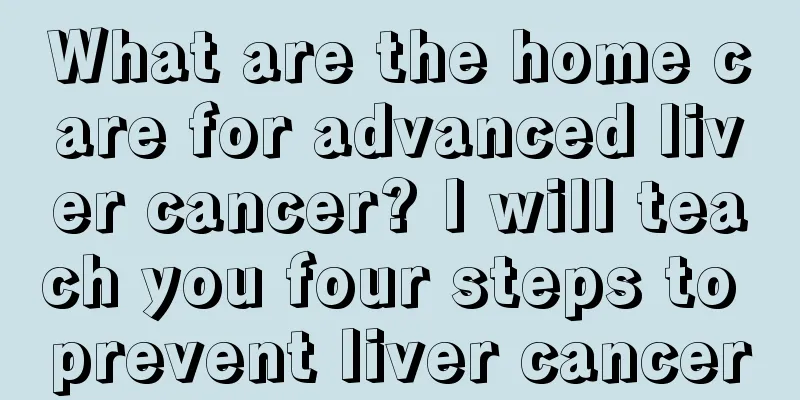What are the home care for advanced liver cancer? I will teach you four steps to prevent liver cancer

|
We often see or hear that many people have liver cancer, and sometimes we are afraid that we may get liver cancer without realizing it. In fact, liver cancer is caused by many complex reasons such as environmental pollution and bad living habits. If we pay more attention to it in our daily life, maybe we can stay away from liver cancer. Teach you four steps to prevent liver cancer 1. Do not eat moldy food The fungi that produce aflatoxin mainly grow in humid tropical and subtropical regions and can cause corn, peanuts and other grains to mold, so you should avoid eating these moldy foods. 2. Control your emotions Emotions, work pressure, and especially a bad mentality have a great impact on the immune system, adding fuel to the fire. After learning that they have been infected with hepatitis, many people are afraid and depressed, lose their appetite all day, and touch their livers with their hands, sometimes for two or three hours, worried that hepatitis will turn into cancer. If this emotion persists for a long time, it will lead to a series of changes in the nervous, endocrine and immune functions, significantly reducing the anti-cancer cells in the blood, and cancer will really occur. 3. Vaccination Vaccination is the most practical and effective method, mainly hepatitis B vaccine and hepatitis A vaccine. Studies have shown that universal hepatitis B vaccination can effectively reduce the hepatitis B virus surface antigen carrier rate from 10% to 1.3% after 10 years, and significantly reduce the incidence of liver cancer after 16 years. 4. Do B-ultrasound Liver B-ultrasound is one of the most effective methods for early detection of liver cancer. Hepatitis patients should undergo a liver B-ultrasound examination once every six months when their condition is stable. In addition, young and middle-aged people who are under fatigue and stress should also include a liver B-ultrasound examination in their health check-ups. What are the home care options for advanced liver cancer? First of all, we need to comfort the patient psychologically. Liver cancer patients are irritable and their families should understand and tolerate them. Secondly, the living environment should be kept clean and comfortable, and the room should be well ventilated. Basic nursing care should achieve "six cleans" (oral cavity, face, hair, hand and foot skin, perineum, bed unit cleaning), "five preventions" (prevent bedsores, prevent orthostatic hypotension, prevent respiratory system infection, prevent cross infection, prevent urinary system infection), "three no's" (no feces, no falling from bed, no scalding), and "one management" (dietary management). Medication safety. Follow the doctor's advice to take medicine on time and in the right amount, and keep the medicine well. Provide health education, guide patients to take care of themselves, correct bad living habits, not smoke, not drink, improve self-care ability, avoid the adverse effects of harmful stressors, and help them maintain mental and physical balance. Encourage patients to participate in normal life, take part in easy work, learn appropriately, and re-establish their own survival value in work and study. Family dietary care for patients with advanced liver cancer Liver cancer patients often have poor appetite and do not want to eat, so during the nursing process, we should focus on improving the patient's appetite and encourage them to eat. Give them high-protein, high-calorie, high-vitamin, low-fat foods. Limit the intake of animal oils. Diversify the diet and pay attention to food matching to ensure that the food is colorful, fragrant, and tasty, so as to increase appetite. Eating should be mainly soft food that is easy to digest, avoid hard and spicy food, eat less fried food, and eat small meals frequently. Avoid irritating food and food with high plant fiber content, so as not to cause rupture and bleeding of esophageal or gastric veins in patients with liver cirrhosis. Eat more fresh vegetables and fruits, drink fruit juice, and supplement vitamins. Patients with fever should drink more water to help dissipate heat. Patients with frequent vomiting should temporarily fast to prevent food from irritating the stomach, increasing the frequency of vomiting, and wasting physical strength. Patients with ascites should limit sodium intake and be given a low-salt or salt-free diet. Patients in the early stages of hepatic coma or hepatic coma should be given a low-protein diet with a total daily protein of 20-40g. Animal proteins with high physiological value, such as milk, eggs, and lean meat, should be used as much as possible. |
Recommend
What is the difference between nano-traceless and thread embedding
There are three main methods for double eyelid su...
Symptoms of lumbar muscle strain, waist pain is the most common
Lumbar muscle strain can cause soreness in the lo...
Does drinking alcohol have any effect when you are pregnant?
Drinking when you are just pregnant will have a c...
Is the current cost of treating osteosarcoma expensive?
Patients with osteosarcoma should be in great pai...
The appropriate method must be used to treat rectal cancer
Nowadays, rectal cancer is considered a common tu...
What should I do if I get liver cancer and feel hungry?
As a malignant tumor of the digestive system, liv...
Is the red-headed centipede poisonous?
Everyone should have seen centipedes. They have m...
What are the preventive measures for the sequelae of radiotherapy for nasopharyngeal carcinoma and what should we pay attention to in our diet?
There will be some sequelae after radiotherapy fo...
What are the nursing methods for renal cancer patients before and after surgery?
Kidney cancer develops in the epithelium of the u...
Bad breath after drinking milk
Milk is very nutritious. It can promote bone deve...
Prevention of complications from radiotherapy for esophageal cancer
There are many types of oncology diseases, which ...
Eating this kind of food every day can help prevent liver cancer. 6 symptoms of early liver cancer
Liver cancer is one of the most harmful cancers t...
Who can't comb their hair with a horn comb
The combs we use in daily life are made of many k...
What is the cause of stomach bloating and vomiting
Many people have experienced stomach bloating and...
How to treat lung melanoma? What are the symptoms of lung melanoma?
Melanoma is a malignant skin cancer with a high m...









